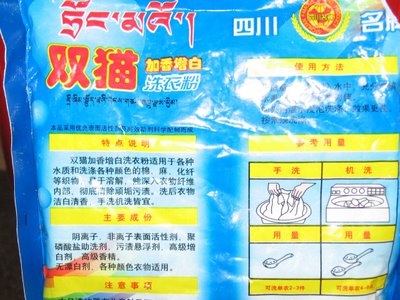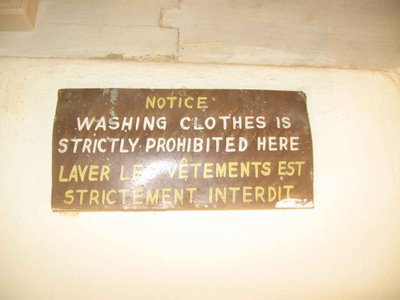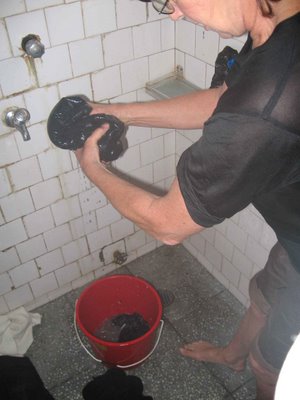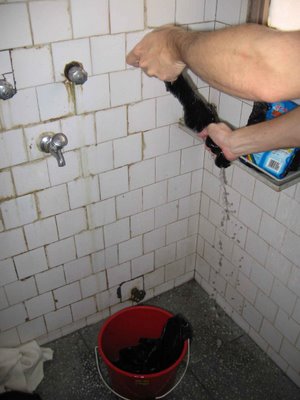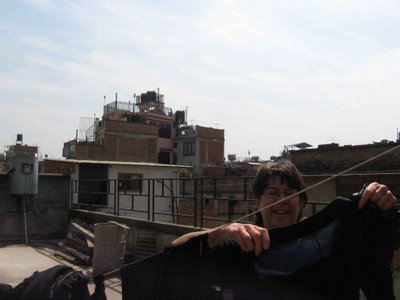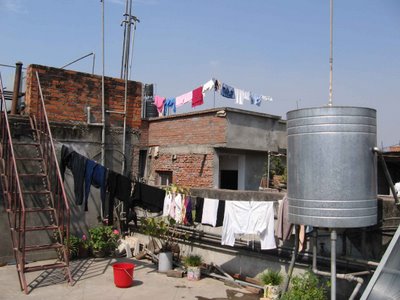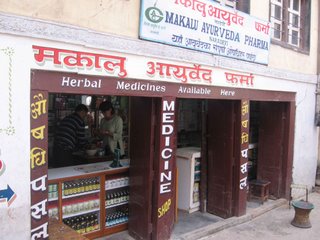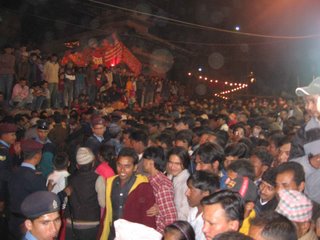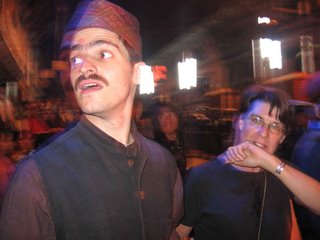At the Anjani "Hair Dresser Saloon for Ladies and Gents"
Every five days or so, when my face has grown bristly, Deb and I take a stroll down into the saloon, where the barbers greet us with great affection and affectation. They offer us a seat in their tiny 6 foot by 10 foot shop while they put the finishing touches on their previous clients, and we get the chance to observe real professionals at work. They wield their tools with great finesse and precision, clicking and clacking their scissors and comb just so. Their hands work with the practiced movements of artists, sculpting and preening their customers with utmost care and skill. It is truly a spectacle to behold, and a fine treatment to be subjected to.
I take my seat in the barber’s chair, and hand myself over. The barber begins by applying the first of many products, some sort of white lotion, and massages it into the face. The barber works like he is preparing a fine cut of meat for roasting, massaging it with spice, and tenderizing. Next he swabs the face clean with cotton, primes the beard with a bit of water. Then comes the lather. This part is very important. A little dab of shaving gel, and the shaving brush, and a Hindi film on the TV, and the guy works away for about five minutes or so, working up a lather, and then working it in, and then lathering some more, from this angle and that angle, all the time keeping track of the TV, and doing quite a thorough job of the lathering part. I think that might be a key to the success of the shave.
Eventually, he determines that the face is sufficiently prepared for the blade, and, with a blessing (evoking the god of shaving, I suppose) the shaving commences.
 A fresh blade in the hands of this skilled craftsman can work wonders on a week’s hard beard growth. He performs his practiced order: first the sideburns, the cheeks, then the throat, then the underside of the chin, the square of the jaw, that little spot under the lower lip, each stroke followed by a flip of the blade over the back of the hand to gather the used lather. He stretches the skin taut between his fingers to catch all of the bristles, a clean shave the first time around. But that is certainly not the end of the treatment.
A fresh blade in the hands of this skilled craftsman can work wonders on a week’s hard beard growth. He performs his practiced order: first the sideburns, the cheeks, then the throat, then the underside of the chin, the square of the jaw, that little spot under the lower lip, each stroke followed by a flip of the blade over the back of the hand to gather the used lather. He stretches the skin taut between his fingers to catch all of the bristles, a clean shave the first time around. But that is certainly not the end of the treatment.Barbers are talkative people, and they’re delighted to have a foreigner to work on and chat with in their own language. Barbershops are very social places, with people constantly coming and going (I should note that at this Saloon for Ladies & Gents, I certainly never saw a lady, apart from Deb). The barbers chatter away the whole time, asking me about why I came to Nepal, places I’ve seen, what my job is, who’s my favorite Hindi film star (?) etc., so I reply in kind, asking them about their job and training. They go to school for two years to learn their profession, though my barber assures me that nine months is enough to do a decent job (I don’t know who they practice on). After their training, they are subjected to exams (no written exam; only practical). Upon the successful completion of their exam, they are felicitated by the Barber’s Union of Nepal, and granted membership to the sacred brotherhood of Hair Cutters.
This is their ritual. Day in and day out, they cut hair. Every day, they perform this shaving ritual many, many times. It is a very involved ritual, and proceeds in a very particular fashion.
After the first shave is completed, another shave is performed to perfect the first. This is one of my favorite sensations of the shave; the application of shaving lather on a freshly shaven face feels like silk pajamas and satin sheets. Deee-Luxe.
Then come the products: first the dabs of the white lotion stuff, that gets massaged in, then the face is slapped with water, and the clear stone thing is rubbed on (stingy). This is followed by another white product from the little screw-top tub with a little bit of talcum powder, and then little dabs of the pink stuff that smells like mint. Another face massage, (we’re getting there…) and then the spray bottle of water comes out. The water is toweled off, and the shave is finished. But that, of course, is not the end of the treatment. Barbershops double as massage parlours, and part and parcel with the shave comes the head massage.
There’s this thing they do with their hands that is impossible to describe in words. It involves folding the hands a particular way, and then these repeated THWAKs on the head. Sounds unpleasant, but it’s not. It is a unique sensation indeed. Their strong rubber-band-like hands massage all of the tension out of the scalp, neck and forehead (they pull it out of the eyebrows). And my favorite guy would do this thing when I least expected it, where he would cradle my head and…CRRACKK goes the neck. Good Morning Folks! Hoo boy!
 This is the treatment that one receives down at the Saloon. I have observed a man examining himself in the mirror for a full ten minutes after his shave. I can’t go in for that sort of vanity, but I know that the shave that I get in Kathmandu is well worth every one of the twenty-five rupees I pay for it (even if they do charge me five or ten rupees extra – foreigner price). The feeling of a fresh shave, cheeks as soft as a baby’s butt, can’t be beat.
This is the treatment that one receives down at the Saloon. I have observed a man examining himself in the mirror for a full ten minutes after his shave. I can’t go in for that sort of vanity, but I know that the shave that I get in Kathmandu is well worth every one of the twenty-five rupees I pay for it (even if they do charge me five or ten rupees extra – foreigner price). The feeling of a fresh shave, cheeks as soft as a baby’s butt, can’t be beat.
